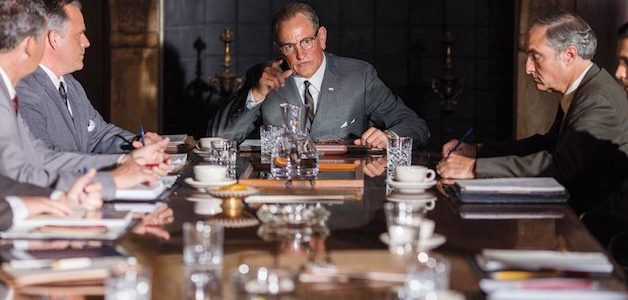
ReelBob: ‘LBJ’ ★★½
By Bob Bloom
In many ways President Lyndon Johnson was a tragic figure.
A consummate politician, he spent more than 20 years in the Senate, rising to the post of Majority Leader, where he used arm twisting, charm and cajolery to get legislation passed.
He also was an ambitious man, who set his sights on the presidency but was thwarted by a young upstart senator from Massachusetts, John F. Kennedy.
Johnson agreed to be JFK’s vice president because he was long-sighted, realizing that if he helped the president, it could be his turn for the office in 1968.
That was Johnson, always seeing the big picture and looking farther down the road than most of his contemporaries.
Much of this comes through in director Rob Reiner’s “LBJ,” which is more a character study of the 36th president than a typical biopic.
The performance of Woody Harrelson as Johnson helps gloss over a multitude of cinematic sins that beset the movie.
Harrelson’s LBJ is crude, shrewd, profane, smart, needy, sensitive and insecure.
In public, he may be a lion, but in private, he’s a lamb riddled with fears and doubts.
Most of all Harrelson paints a portrait of a man desperate to be loved and respected, something he does not receive from the Kennedys.
Which brings us to one of the movie’s problems — notably, the pictures Reiner creates of John F. and Robert F. Kennedy.
Both men treat Johnson with condescension, refusing to allow him into their inner circle. To them, LBJ is a dinosaur from a Jurassic political era.
Robert F. Kennedy, especially, though known for his ruthlessness, is basically shown as a mean-spirited punk who cannot abide even the sight of his brother’s vice president.
This may be a plot device — a dramatic historical distortion — to create a movie “villain” and win sympathy for Johnson, but it rings rather false.
Yes, it is true that RFK did not like nor trust Johnson, but this cinematic rendition of the presidential confidant-attorney general comes across as petty and spiteful.
“LBJ” basically covers five years of Johnson’s career — from 1959 when he contemplates running for president to 1964, when — after JFK’s assassination — he decides to fulfill his predecessor’s agenda of passing civil-rights legislation.
And this is another of the film’s mishaps: The movie ends with Johnson telling his staff that he will push those measures through Congress because it’s the right and just action to take.
Then, instead of showing us what Johnson does best — wheel and deal, we see a prologue telling us how he was able to pass such groundbreaking legislation as Medicare, Medicaid, voting rights, etc.
Historically, “LBJ” is a glossed-over “Classics Illustrated” look at tumultuous time in the United States.
As a depiction of an individual who put nation ahead of politics and self, “LBJ” is like the man himself — flawed but larger than life.
I am a member of the Indiana Film Journalists Association. My reviews appear at ReelBob (reelbob.com) and Rottentomatoes (www.rottentomatoes.com). I also review Blu-rays and DVDs. I can be reached by email at bobbloomjc@gmail.com or on Twitter @ReelBobBloom. Links to my reviews can be found on Facebook, Twitter, Google+ and LinkedIn.
LBJ
2½ stars out of 4
(R), language